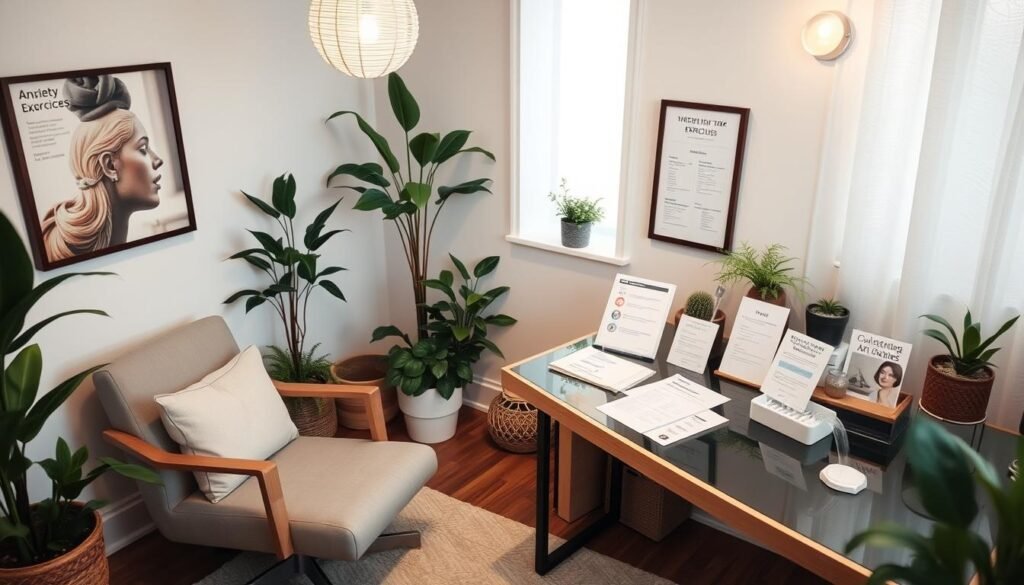Did you know that about 30% of adults will face a lot of fear and worry sometime? This shows the big impact of anxiety, which can make people feel dizzy. It’s often hard to tell if dizziness causes anxiety or the other way around. Yet, understanding the link between the two is key. This knowledge helps find ways to lessen symptoms and improve life quality.
Dizziness can come from things that make us anxious, like breathing too fast or panic. This might make you feel light-headed, sick, or numb. Anxiety might also make you more likely to get sick, which can make you dizzy. If you’re dealing with these feelings, it’s good to know the physical signs of anxiety disorders. There are many ways to handle these symptoms. This article will talk about what causes anxiety dizziness, its signs, and how to treat it.
Key Takeaways
- Anxiety disorders affect about 30% of adults, significantly impacting their daily lives.
- Dizziness can be both a symptom and a trigger for individuals with anxiety.
- Understanding the symptoms of anxiety dizziness is crucial for timely intervention.
- Relief tips for anxiety dizziness include relaxation techniques and lifestyle changes.
- Professional treatment options like therapy and medication can help manage symptoms effectively.
Understanding the Link Between Anxiety and Dizziness
Anxiety and dizziness often go hand in hand. They create a complex relationship that can affect a person’s life deeply. Understanding how they interact can highlight their influence on each other. Dizziness has many causes that add to anxiety disorder symptoms. This link matters a lot because anxiety disorders impact over 18 percent of people in the US. That’s more than 40 million adults each year.
The Mechanisms Behind Anxiety-Induced Dizziness
When people feel very anxious, their bodies change in ways that can cause dizziness. Stress hormones like cortisol mess with the vestibular system, which keeps us balanced. This leads to feeling dizzy. People who often feel anxious are more likely to get dizzy from things like BPPV compared to those who don’t. Too much worry can make dizziness worse, causing more anxiety and harming a person’s life.
When Dizziness Triggers Anxiety
Dizziness and anxiety can start a difficult cycle. Feeling off-balance makes someone worry about their health. This worry can make them feel even more unsteady. To break this cycle, treating both is key. Cognitive behavioral therapy (CBT) and talking to a psychologist can help. These methods have helped people feel better from both anxiety and dizziness.
Common Causes of Anxiety Dizziness
Dizziness often comes from things that make us anxious. Knowing why dizziness happens is key to dealing with it. Causes include hyperventilation and panic attacks. Learning about these reasons helps people find good ways to cope.
Hyperventilation and Its Impact on Dizziness
Hyperventilation is a big cause of dizziness. It’s when you breathe too fast and too much, dropping carbon dioxide levels. This leads to feeling like you’re going to faint, especially when you’re very anxious. People with anxiety disorders can lessen this by learning to control their breathing better.
The Role of Panic Attacks in Causing Dizziness
Panic attacks can make you feel super anxious and dizzy. When they happen, you might feel out of control, which makes you dizzy and disoriented. A study in Germany showed that more than a quarter of people with anxiety feel dizzy. Knowing about panic attacks helps people find the right help.
Other Physical Symptoms That Contribute to Dizziness
Many physical issues can also make dizziness worse if you’re anxious. Things like not drinking enough water and having low blood pressure can make it harder. Problems with balance, migraines, or Meniere’s disease can also be factors. It’s a good idea to talk to a doctor to figure out all the reasons, ensuring you get the best care.
Understanding these causes of dizziness helps people manage it and lead healthier lives. For more on how anxiety affects dizziness, check this resource.
Symptoms Associated with Anxiety Dizziness
It’s vital to know the symptoms of anxiety dizziness to manage it correctly. It may feel like you’re lightheaded, the room is spinning, or you’re not steady on your feet. Knowing these signs can help people understand their experiences better. Then, they can get the help they need.
Identifying Key Symptoms of Anxiety Dizziness
People with anxiety dizziness often feel lightheaded. They may feel like they or the room is spinning. They might also feel unsteady or lose their balance. Other symptoms can include feeling sick to their stomach or shaking.
- Lightheadedness
- Feelings of spinning (vertigo)
- Unsteadiness or loss of balance
- Nausea
- Trembling or shaking
These signs often point to an anxiety disorder. For example, generalized anxiety disorder (GAD) can cause constant dizziness. This happens because of ongoing worry that affects the inner ear system. With panic disorder, dizziness comes on fast during panic attacks. These attacks also bring fast heartbeats and chest pains.
Differentiating Between Dizziness Types: Chronic vs. Acute
It’s important to know the difference between chronic and acute dizziness. Chronic dizziness lasts a long time. It can make daily life hard. People with anxiety disorders might feel this way often. Acute dizziness happens all of a sudden. It’s usually because of panic attacks or when someone is very stressed. Knowing the difference helps people get the right help and manage their symptoms better.

For more information on how anxiety and dizziness are connected, check this out: Anxiety and Dizziness.
| Dizziness Type | Duration | Associated Symptoms |
|---|---|---|
| Chronic Dizziness | Persistent | Lightheadedness, nausea, balance issues |
| Acute Dizziness | Sudden | Spinning sensation, palpitations, shortness of breath |
Management Strategies for Anxiety Dizziness
Managing anxiety dizziness involves effective strategies. These can greatly better your day-to-day life and mental well-being. This section will cover relaxation methods, mindfulness, and how exercise can help with anxiety.
Relaxation Techniques to Alleviate Dizziness
Relaxation methods are key to easing anxiety-related dizziness. Using deep breathing and guided imagery can drop stress levels. This can bring a feeling of peace and steadiness, lowering the chances of dizziness.
Mindfulness and Breathing Exercises
Mindfulness helps you stay focused on the present. It lets you notice your thoughts and feelings without judgment. Breathing exercises are part of mindfulness. They help control your breath and cut down anxiety. Adding these into your routine can help you manage how often and how bad the dizziness gets.
Exercise as a Tool for Reducing Anxiety
Exercise is great for handling anxiety and dizziness. Physical activities release endorphins, lifting your spirits and improving mental health. Making exercise part of your anxiety treatment can ease worry. It also distracts you from negative thoughts, leading to better emotional well-being.

| Management Strategy | Benefits | Examples |
|---|---|---|
| Relaxation Techniques | Reduces acute dizziness, promotes calmness | Deep breathing, guided imagery |
| Mindfulness Practices | Enhances awareness, improves sensation control | Meditation, body scanning |
| Exercise | Boosts mood, reduces anxiety symptoms | Yoga, jogging, swimming |
Professional Treatment Options for Anxiety Dizziness
Anxiety dizziness can significantly impact daily life. Understanding the available professional treatment options allows individuals to take informed steps toward managing their symptoms. Two primary avenues for addressing anxiety-induced dizziness are cognitive behavioral therapy and various anxiety medications.
Cognitive Behavioral Therapy (CBT) as a Treatment
Cognitive behavioral therapy is known for being effective in treating anxiety disorders. This method helps people change negative thought patterns that feed their anxiety. This, in turn, helps lessen feelings of dizziness.
By using CBT, individuals gain skills to manage their anxiety better. It’s a valuable choice for those struggling with anxiety dizziness.
Medications That Help Manage Anxiety Symptoms
Anxiety medications serve an important role in symptom relief. Common treatments include selective serotonin reuptake inhibitors (SSRIs) and beta-blockers. These medications adjust the brain’s chemistry. They are effective in managing anxiety and its physical effects, like dizziness.
For more details on treating anxiety dizziness with professional help, check this link.

| Treatment Type | Description | Benefits |
|---|---|---|
| Cognitive Behavioral Therapy | A structured therapy focusing on changing negative thought patterns. | Helps reduce anxiety levels, which can alleviate dizziness. |
| Selective Serotonin Reuptake Inhibitors (SSRIs) | Medications that increase serotonin levels in the brain. | Can dampen anxiety symptoms, including dizziness and panic attacks. |
| Beta-Blockers | Medications that help reduce physical symptoms of anxiety. | Effective in managing heart rate and physical responses during anxiety episodes. |
Self-Care Tips for Managing Anxiety Dizziness
Self-care is key to handling anxiety dizziness. Simple everyday strategies can make a big difference. Knowing what triggers your anxiety helps you manage it better.
Building Awareness of Triggers
It’s important to know what sparks your anxiety. This knowledge lets you prepare for and deal with those triggers. Talking about your experiences with friends or writing them down can help. Finding these triggers is a step towards better mental health.
Maintaining a Healthy Lifestyle to Reduce Anxiety
Living a healthy lifestyle helps your mood a lot. Here are some habits to adopt:
- Balanced Nutrition: Eat lots of fruits, veggies, whole grains, and lean meats to boost your mood and energy.
- Consistent Hydration: Drinking plenty of water keeps you healthy and may lessen dizziness.
- Adequate Sleep: Good sleep is crucial for dealing with anxiety and dizziness symptoms.
- Regular Exercise: Physical activities reduce stress and anxiety, helping with dizziness.
Adding these habits to your life builds strength against anxiety. Discover more ways to manage it with natural remedies. These self-care routines lead to a better life quality.
Anxiety Dizziness: When to Seek Medical Help
Knowing when anxiety-related dizziness needs medical help is key for your health. Some symptoms could be signs of serious problems needing quick help. It’s important to spot these early for the right medical response and treatment.
Recognizing When Symptoms May Indicate a Serious Issue
Severe headaches, vomiting, or sudden dizziness after taking new medication are warning signs. These could suggest you need urgent care. Dizziness linked with serious conditions, like dehydration or heart issues, requires careful attention.
Traumatic brain injury or Meniere’s disease symptoms also demand close watch. Listen to your body’s warning signals carefully.
Consulting Healthcare Professionals for Persistent Dizziness
If dizziness doesn’t go away, see a healthcare professional soon. Ongoing dizziness could be due to many health problems, such as diabetes or ear infections. The risk of vertigo might be higher for those with anxiety too.
Getting medical advice helps clear up any confusion and prevents further issues. By talking openly with doctors about your symptoms, you get better, more focused care.
| Potential Symptoms | Associated Serious Issues | Recommended Actions |
|---|---|---|
| Severe Headaches | Possible concussion or migraines | Seek immediate medical evaluation |
| Vomiting | Dehydration or vestibular issues | Consult healthcare professionals |
| Sudden Dizziness | Heart problems or anxiety attacks | Emergency medical help required |
| Persistent Dizziness | Inner ear infection or diabetes-related conditions | Schedule an appointment with a doctor |
Conclusion
Understanding how anxiety and dizziness connect is key to managing them well. Knowing the physical causes behind these feelings is important. It helps us see why anxiety makes dizziness worse.
There are many ways to ease these symptoms. Options include therapy, medicine, and changes in how we live. People with ongoing dizziness from anxiety need to know what sets it off. Taking care of oneself is crucial.
Mindfulness, exercise, and eating well can really help control anxiety and dizziness. Being aware and using good strategies can improve overall health. There’s hope for dealing with anxiety-related dizziness.
Getting the right help and using personal strategies can make a big difference. For more details on anxiety and dizziness, check out this informative article.